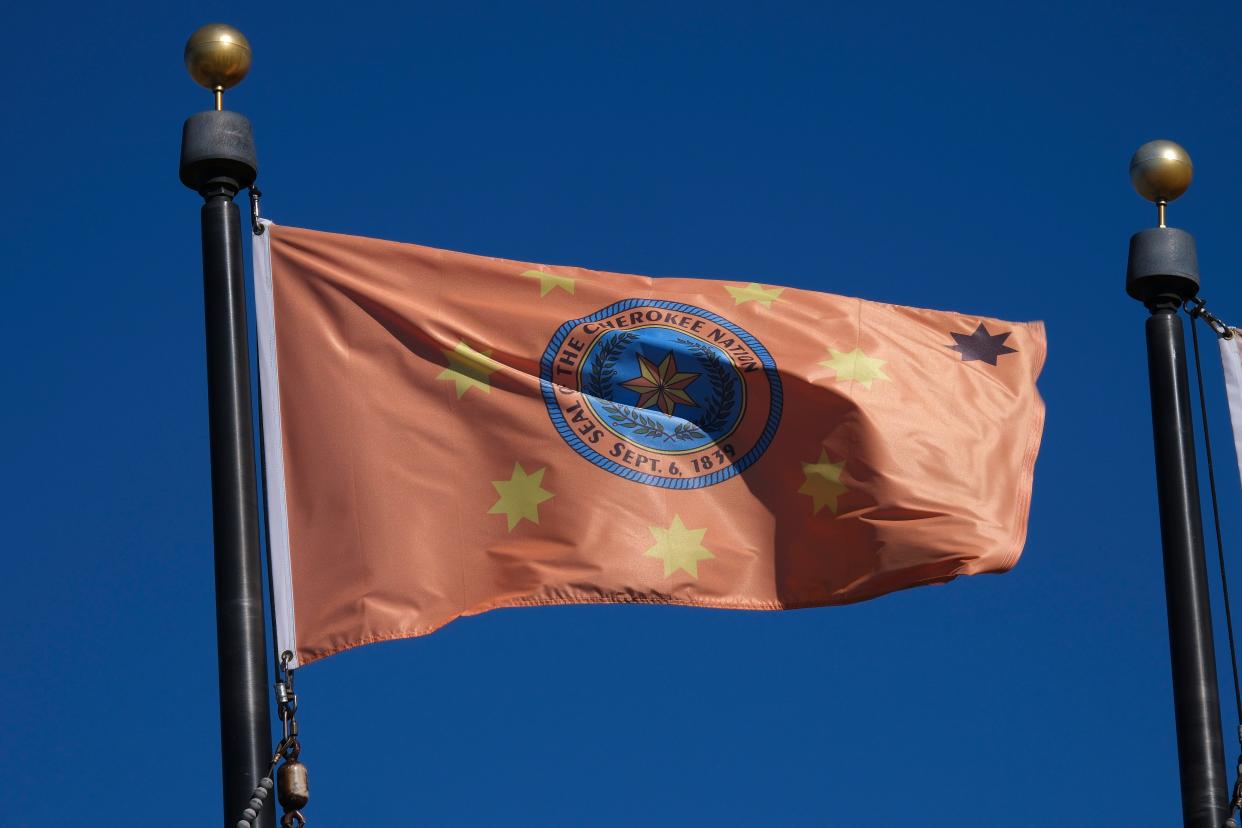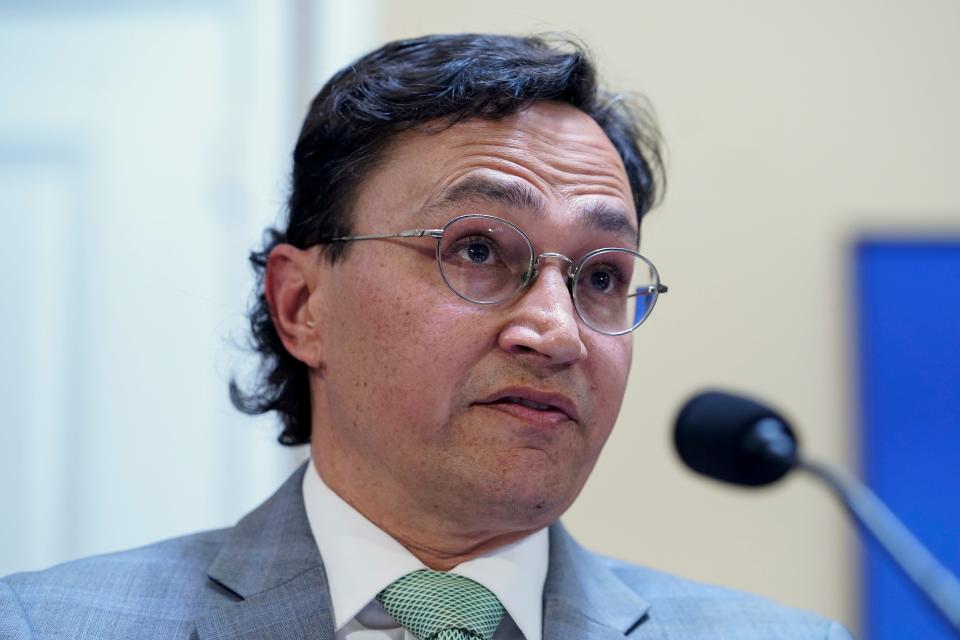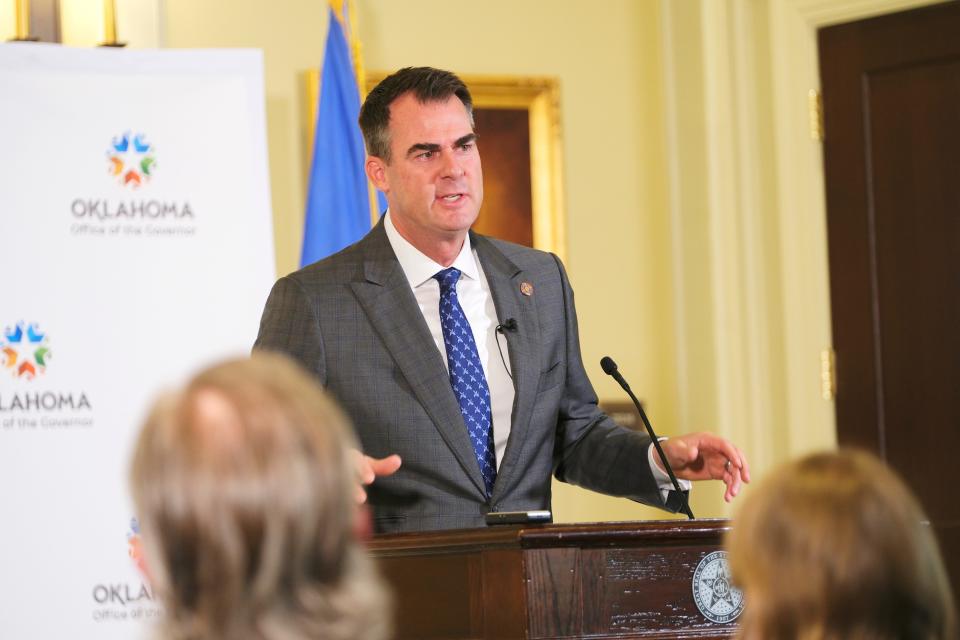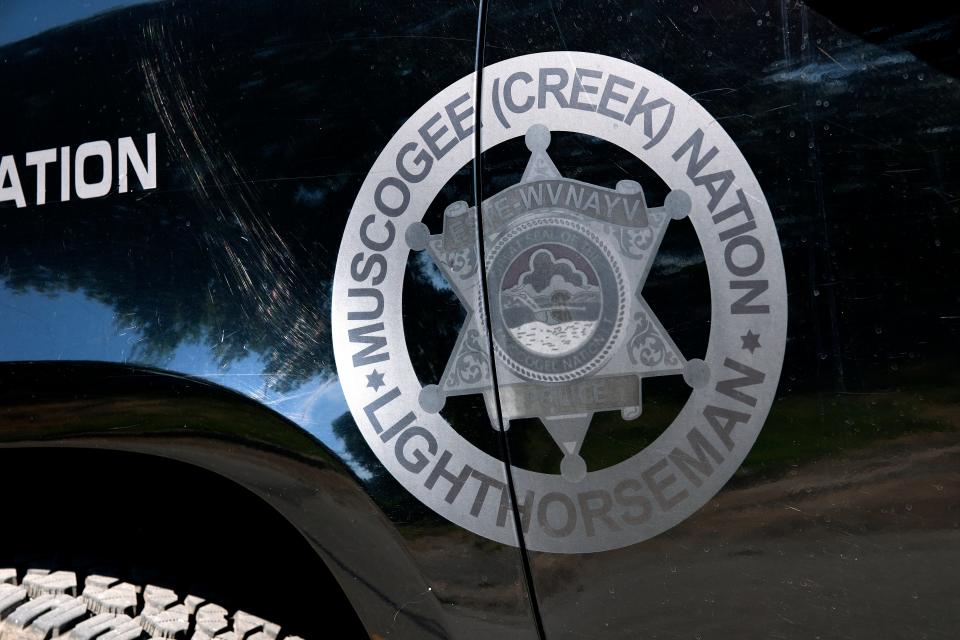Cherokee Nation won't join Oklahoma governor's new reservation public safety task force

- Oops!Something went wrong.Please try again later.
Oklahoma's largest tribal nation won’t join Gov. Kevin Stitt’s task force to study the “havoc” caused by tribes gaining more power to prosecute crimes on their reservations.
Chuck Hoskin Jr., the principal chief of the Cherokee Nation, said he disagrees with the premise of the new task force, as well as its makeup — only two of its 13 seats are reserved for the 38 tribal nations based in Oklahoma.
The governor said in a Dec. 22 executive order that he was creating the task force to come up with fixes to the “broken system created by the McGirt decision.” The 2020 Supreme Court ruling has led to the recognition of at least eight tribal reservations in the eastern half of Oklahoma. The state’s power to prosecute tribal citizens accused of crimes on those lands is limited. Those cases now land in tribal and federal courts.
“If (Stitt) wants us to sign on to a task force that presupposes McGirt is broke, that reservations are a problem that need to be fixed, then we don’t feel welcome to participate,” Hoskin told The Oklahoman on Friday.

A spokesperson for the governor described the Cherokee Nation's decision as disappointing, but said Stitt hoped to still have representation from both large and small tribal nations on the task force.
"The purpose of a task force is to try and bring representatives from groups together," said Abegail Cave, the governor's communications director.
Why Oklahoma Gov. Kevin Stitt called the task force
Stitt, who is a Cherokee Nation citizen himself, has said a dispute between Muscogee Nation police and Okmulgee County jail staffers prompted him to launch the task force. In his executive order, he described the incident as a “stark reminder” of the negative fallout of McGirt.
He asked the task force to suggest legal and policy changes that could help remedy the confusion.
Hoskin disputed claims of widespread disagreement and confusion, noting that the Cherokee Nation has worked out agreements with more than 90 other law enforcement agencies that operate within its northeast Oklahoma reservation. The agreements allow officers to enforce state and tribal public safety laws at the same time, so they can respond to calls and make arrests regardless of whether or not someone is a tribal citizen.
Stitt called for the task force to create uniform versions of those operating agreements, which are usually called cross-deputization agreements. Hoskin said those agreements already exist and are vital for public safety.
“It’s just the day-to-day work of law enforcement in the Cherokee Nation reservation,” Hoskin said.
At least one of those state-tribal working relationships appears to be in peril, however. The Grand River Dam Authority, a state agency in charge of policing certain bodies of water, notified the Cherokee Nation on Friday that it was suspending the ability of tribal officers to act on its behalf, Hoskin said in a statement.
Hoskin asserted the agency was pressured by Stitt to make the move. The governor's office did not say whether Stitt directed the move, but said he had “asked for consistency from all state law enforcement as we continue to evaluate the impacts of the conflict in Okmulgee County last month.”
He was referring to a dispute that flared up when Muscogee Nation Lighthorse Police arrested a non-Native man in Okmulgee under a working agreement the tribe had signed with the Grand River Dam Authority. Lighthorse officers said the man was driving the wrong way near a school zone and admitted to having fentanyl.
When tribal officers attempted to drop the man off at the Okmulgee County jail on Dec. 18, jail staffers refused to book the man. The disagreement escalated to a physical altercation, which led the Muscogee Nation to file criminal charges against one jailer accused of assaulting a tribal police officer.
It was the same incident that drove Stitt to form the task force.

The governor called for one task force member to represent the Five Tribes, which includes the Cherokee Nation, and a second task force member to represent the remaining 33 federally recognized tribal nations in the state. He assigned other seats to Oklahoma's public safety secretary, House speaker, Senate president pro tem and attorney general. He also made spots for representatives of the Oklahoma District Attorneys Council; a county jail trust; the Oklahoma Sheriffs’ Association; the Oklahoma Department of Public Safety; the Oklahoma State Bureau of Investigation; the Oklahoma Council on Law Enforcement Education and Training; and the Oklahoma State Fraternal Order of Police.
Tribal nations are not sufficiently represented on the task force, leader says
The roster lacks sufficient representation from tribal nations, Hoskin said.
“We’re talking about the subject of law enforcement and public safety within our reservations,” he said. “I think the executive order minimizes representation, and on that basis, it’s fatally flawed.”
Hoskin spoke with The Oklahoman by phone while he was attending a joint council meeting of the Five Tribes in Tulsa. The inter-tribal group, which also includes the Chickasaw, Choctaw, Muscogee and Seminole nations, has not yet issued a formal position on Stitt's new task force.

David Hill, the principal chief of the Muscogee Nation, previously called for tribal nations to have a larger role on the task force. “Eleven state agencies will be represented to speak for themselves,” Hill said when the task force was announced. “Tribes should be afforded the same opportunity.”
When asked whether the governor would consider adding seats for additional tribal nations, his office did not say, but said Stitt recognized “tribal members would be further represented by other seats on the task force.”
“This task force was designed to find a solution to an issue that is impacting all Oklahomans in the eastern part of the state, so the governor maintains hope that tribes, large and small, will be a part of this process,” Cave said.
The first meeting date for the task force has not been announced.
Stitt and Hoskin — the top elected officials of the state of Oklahoma and of the Cherokee Nation — are often at odds.
Hoskin has been one of the most vocal proponents of the McGirt ruling and the way it empowered tribal justice systems, while Stitt has been the decision's loudest critic. The two frequently spar in public comments over McGirt and other issues, as recently as earlier this month when Stitt opted out of a federal program to ensure low-income children have food when school is out for the summer. Hoskin said the Cherokee Nation would participate in the food program and serve all children who live on its reservation and qualify for aid.
The Chickasaw Nation in south-central Oklahoma and the Choctaw Nation in southeast Oklahoma also plan to participate.
Molly Young covers Indigenous affairs. Reach her at mollyyoung@gannett.com or 405-347-3534.
This article originally appeared on Oklahoman: Cherokee Nation won't join Oklahoma tribal reservation task force

